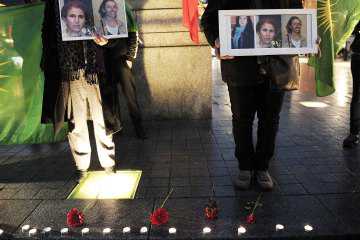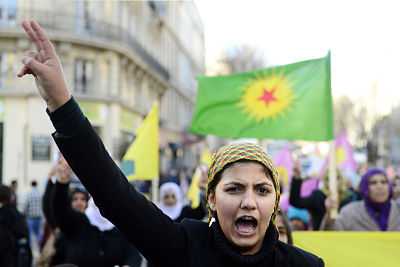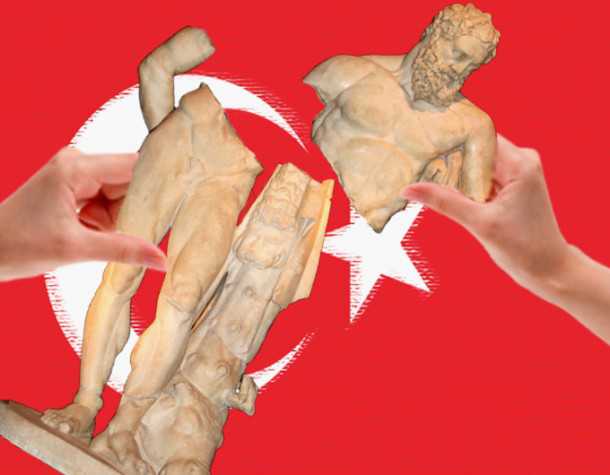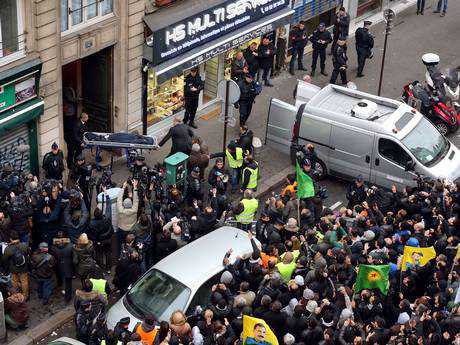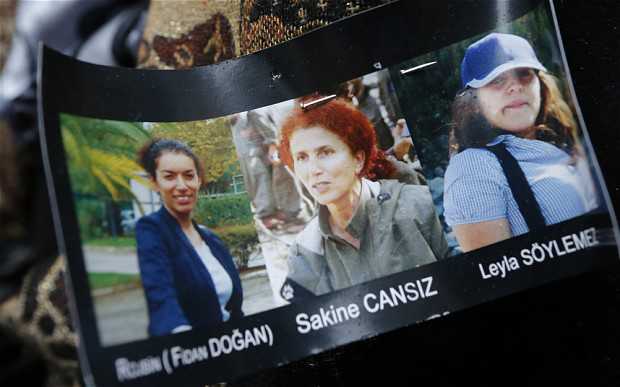PARIS — Turkey’s prime minister suggested Friday that a feud among Kurdish rebels was behind the shooting deaths of three Kurdish activists in Paris, and the rebels said it was an attempt to undermine peace talks that their jailed leader is holding with Turkey.
The three activists, including reportedly the founding member of the autonomy-seeking Kurdish rebel group Kurdistan Workers Party, also known as PKK, were found inside a Kurdish center in the French capital on Thursday. The killings stunned the Kurdish community in Europe and put France in a delicate position as it tries to improve ties with Turkey.
Kurds have accused Turkey of the slayings, while Turkish officials have suggested the killings may be part of an internal feud or an attempt to derail the talks.
Prime Minister Recep Tayyip Erdogan said Friday that the need for a code to enter the Kurdish center where the women died, suggested that the women probably knew the killer. Erdogan indicated that the center was locked from the inside.
“It’s not something that people who don’t know the code can open,” Erdogan told a group of journalists aboard a plane on his return from a visit to Senegal. “Those three opened (the door). They wouldn’t open the door to people they don’t know.”
A PKK statement, carried by the Kurdish Firat news agency, condemned the killings and said they were an “attempt to undermine” the talks between Turkey and Ocalan.
It blamed the deaths on “international powers” and alleged secretive forces in Turkey and added: “the killings will not remain without a response.”
Turkey is holding peace talks with the Kurdistan Workers Party, which seeks self-rule for Kurds in the country’s southeast, to try to persuade it to disarm. The conflict between PKK and the Turkish government has claimed tens of thousands of lives since 1984.
Agnes Thibault-Lecuivre, spokeswoman for the Paris prosecutor, said one of the women killed was “very, very probably” Sakine Cansiz, a founding member of the PKK in her 50s. The other two victims have been identified as Leyla Soylemez and Fidan Dogan, Kurdish activists in their 20s.
The three women were all killed with multiple gunshots to the head, Thibault-Lecuivre said. France’s interior minister has called the slayings an “execution.”
Family members of the victims came to Paris and were meeting with French authorities and members of the Kurdish community Friday. Visitors placed candles and flowers in front of the building housing the information center where they were killed.
Mourner Selik Hick said he had known one of the victims, Cansiz. She “gave her life for freedom and for the freedom of the Kurdish people,” Hick, 46, said at the site.
Turkey’s state-run Anadolu Agency reported that the autopsies will take about a week, and that the families planned to take the bodies to Turkey for burial. It said police spoke with the Kurdistan Information Center’s neighbors, but that no one had witnessed the attack.
Kurds from Germany and Turkey came to Paris to express support, and planned a demonstration in the French capital Saturday.
___
Suzan Fraser in Ankara, Turkey, contributed to this report.
via PKK Executions: Turkey, Kurds Blame Each Other For Slayings Of Sakine Cansiz, Militant Activists.

